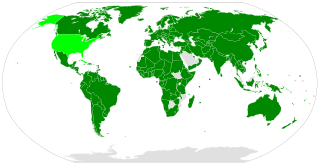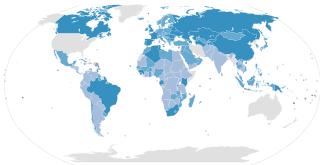| C102 | |
|---|---|
| ILO Convention | |
| Date of adoption | June 28, 1952 |
| Date in force | April 27, 1955 |
| Classification | Social security |
| Subject | Social security |
| Previous | Holidays with Pay (Agriculture) Convention, 1952 |
| Next | Maternity Protection Convention (Revised), 1952 |
Social Security (Minimum Standards) Convention, 1952 is an International Labour Organization Convention on social security and protection at the contingencies that include any morbid condition, whatever its cause and pregnancy.[Article 8]
It was established in 1952, with the preamble stating:
Having decided upon the adoption of certain proposals with regard to minimum standards of social security,...
As of December 2022, the convention has been ratified by 65 states.

The International Labour Organization (ILO) is a United Nations agency whose mandate is to advance social and economic justice by setting international labour standards. Founded in October 1919 under the League of Nations, it is one of the first and oldest specialised agencies of the UN. The ILO has 187 member states: 186 out of 193 UN member states plus the Cook Islands. It is headquartered in Geneva, Switzerland, with around 40 field offices around the world, and employs some 3,381 staff across 107 nations, of whom 1,698 work in technical cooperation programmes and projects.
Labour laws are those that mediate the relationship between workers, employing entities, trade unions, and the government. Collective labour law relates to the tripartite relationship between employee, employer, and union.
Labor rights or workers' rights are both legal rights and human rights relating to labor relations between workers and employers. These rights are codified in national and international labor and employment law. In general, these rights influence working conditions in the relations of employment. One of the most prominent is the right to freedom of association, otherwise known as the right to organize. Workers organized in trade unions exercise the right to collective bargaining to improve working conditions.
The International Convention for the Safety of Life at Sea (SOLAS) is an international maritime treaty that sets minimum safety standards in the construction, equipment and operation of merchant ships. The International Maritime Organization convention requires signatory flag states to ensure that ships flagged by them comply with at least these standards.

The International Covenant on Economic, Social and Cultural Rights (ICESCR) is a multilateral treaty adopted by the United Nations General Assembly (GA) on 16 December 1966 through GA. Resolution 2200A (XXI), and came in force from 3 January 1976. It commits its parties to work toward the granting of economic, social, and cultural rights (ESCR) to the Non-Self-Governing and Trust Territories and individuals, including labour rights and the right to health, the right to education, and the right to an adequate standard of living. As of July 2020, the Covenant has 171 parties. A further four countries, including the United States, have signed but not ratified the Covenant.

The Constitutive Act of the African Union sets out the codified framework under which the African Union is to conduct itself. It was signed on 11 July 2000 at Lomé, Togo. It entered into force after two thirds of the 53 signatory states ratified the convention on 26 May 2001. When a state ratifies the Constitutive Act, it formally becomes a member of the AU. All 55 signatory states have ratified the document, with South Sudan and Morocco ratifying as the last African states.

The ILO Convention Concerning Minimum Age for Admission to Employment C138, is a convention adopted in 1973 by the International Labour Organization. It requires ratifying states to pursue a national policy designed to ensure the effective abolition of child labour and to raise progressively the minimum age for admission to employment or work. It is one of eight ILO fundamental conventions. Convention C138 replaces several similar ILO conventions in specific fields of labour.
International Convention on Standards of Training, Certification and Watchkeeping for Seafarers (STCW) sets minimum qualification standards for masters, officers and watch personnel on seagoing merchant ships and large yachts. STCW was adopted in 1978 by the International Maritime Organization (IMO) conference in London, and entered into force in 1984. The Convention was significantly amended in 1995 and 2010 entered into force on 1 January 2012.
Medical Care and Sickness Benefits Convention, 1969 is an International Labour Organization Convention. It was established in 1969 revised Convention C24 Sickness Insurance (Industry) Convention, 1927 and Convention C25 Sickness Insurance (Agriculture) Convention, 1927.
Maternity Protection Convention (Revised), 1952 is an International Labour Organization Convention.
Merchant Shipping Convention, 1976 is an International Labour Organization Convention.
Termination of Employment Convention, 1982 is an International Labour Organization Convention. Its purpose is to coordinate minimum levels of job security in the laws of ILO member states.
Home Work Convention, created in 1996, is an International Labour Organization (ILO) Convention, which came into force in 2000. It offers protection to workers who are employed in their own homes.
The following outline is provided as an overview of and topical guide to the United Nations:
Work in Fishing Convention (2007) C 188, was adopted at the 96th International Labour Conference (ILC) of the International Labour Organization ILO in 2007. The objectives of the Convention is to ensure that fishers have decent conditions of work on board fishing vessels with regard to minimum requirements for work on board; conditions of service; accommodation and food; occupational safety and health protection; medical care and social security. It applies to all fishers and fishing vessels engaged in commercial fishing operations. It supersedes the old Conventions relating to fishermen.
Iranian labor law describes the rules of employment in Iran. As a still developing country, Iran is considerably behind by international standards. It has failed to ratify the two basic Conventions of the International Labour Organization on freedom of association and collective bargaining, and one on abolition of child labor. Countries such as the US and India have also failed to ratify many of these Conventions and a mere 14 other Conventions, only 2 since the Islamic Revolution.

The Maritime Labour Convention (MLC) is an International Labour Organization (ILO) convention, number 186, established in 2006 as the fourth pillar of international maritime law and embodies "all up-to-date standards of existing international maritime labour Conventions and Recommendations, as well as the fundamental principles to be found in other international labour Conventions". The other pillars are the SOLAS, STCW and MARPOL. The treaties applies to all ships entering the harbours of parties to the treaty (port states), as well as to all ships flying the flag of state party (flag states, as of 2021: over 91 per cent).

The Convention on Domestic Workers, formally the Convention concerning Decent Work for Domestic Workers is a convention setting labour standards for domestic workers. It is the 189th ILO convention and was adopted during the 100th session of the International Labour Organization, in 16 June 2011. It entered into force on 5 September 2013.
International labour law is the body of rules spanning public and private international law which concern the rights and duties of employees, employers, trade unions and governments in regulating Work and the workplace. The International Labour Organization and the World Trade Organization have been the main international bodies involved in reforming labour markets. The International Monetary Fund and the World Bank have indirectly driven changes in labour policy by demanding structural adjustment conditions for receiving loans or grants. Issues regarding Conflict of laws arise, determined by national courts, when people work in more than one country, and supra-national bodies, particularly in the law of the European Union, has a growing body of rules regarding labour rights.
In Japan, a person with a disability is defined as: "a person whose daily life or life in society is substantially limited over the long term due to a physical disability or mental disability". Japan ratified the United Nations Convention on the Rights of Persons with Disabilities (CRPD) on 20 January 2014.